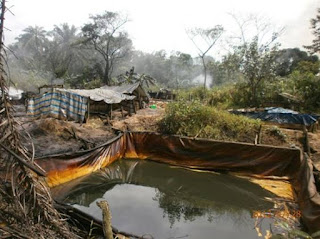The
Niger Delta region in South Southern Nigeria, which is has been defined as
among the most polluted places on earth, is becoming even more polluted.
 |
Types of Local refineries: (Pix by
ENVIRONMENTAL RIGHTS ACTION/FRIENDS OF THE EARTH, NIGERIA (ERA/FoEN) |
This is because of the proliferation of illegal local refining of crude oil by indigenes of some areas in the oil rich region.
Actors
in this business capitalize on the inability of Nigerian government to establish
functional refineries to locally refine petroleum.
The illegal refineries known in local parlance as “Kpo Fire” involve the cooking of crude oil in big cans or pots by fire from firewood.
In the process, large quantities of the crude spill on the ground, while other harmful bye products of crude oil, as well as smoke from the burning of firewood emit to the atmosphere, polluting it.
Reports show that there are thousands of such illegal refineries in the creeks and buses of the Niger Delta region, especially States Bayelsa, Delta and Rivers.
Sources say part of the reason Kpo fire still flourishes is because there are ready markets for their products.
But who these patrons of illegal refiners of crude oil, is the story for another day.
The Niger Delta is reported to hosts over 2,000 spill sites, which has led to the loss of ecosystem and local livelihoods.
Ogoni people who are the real indigenes of the Niger Delta are mostly impoverished as their oil rich land has only brought them curse, many say.
The country’s environmental laws are said to be mostly outdated and cannot propel government environmental agencies like Department of Petroleum Resources, (DPR) and National Environmental Standards and Regulations Agencies, (NESREA) to protect the countries landscape from pollution.
Conquering KPO FIRE proliferation, experts Nigeria must rise up to the challenge of refining crude locally and making petroleum products cheaper for citizens, especially those in Niger Delta.
Nigeria is among the largest oil producing countries in the World and has been in the business for 60 years, yet it has no functional refineries yet it has no refineries to produce for local consumption, let alone for export.
Between 1978 and 1989, NNPC constructed refineries in Warri, Kaduna and Port Harcourt and took over the 35,000-barrel Shell Refinery established in Port Harcourt in 1965.
Lack of care of the refineries has left them in moribund state.
NNPC
has a mandate to supply the country with petroleum products.
To achieve this, it is allocated 445,000 barrels of crude per day.
However, because the Nigerian refineries run at very low 18-20% capacity, the country usually has about 222,500 barrels of oil left from its allocation of 445,000 barrels per day.
NNPC thus allocates the rest of the crude oil to oil trading companies through a “swap arrangement” which mandates the company to supply Nigeria refined petroleum products in exchange for crude oil.
By Innocent Onoh


No comments:
Post a Comment